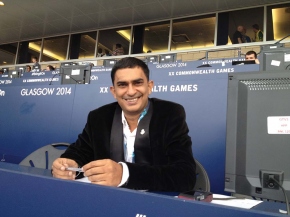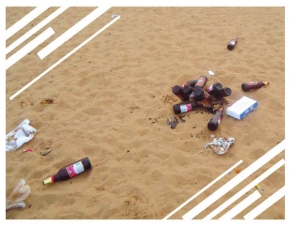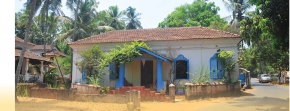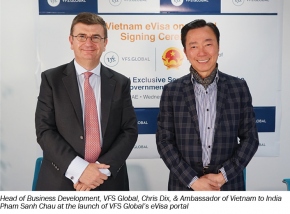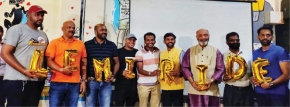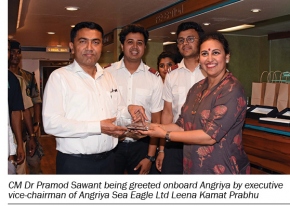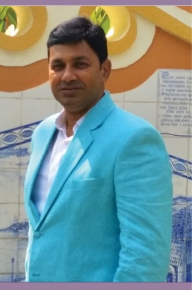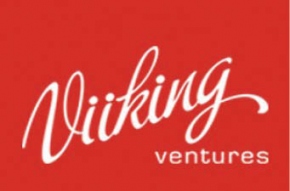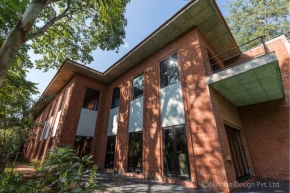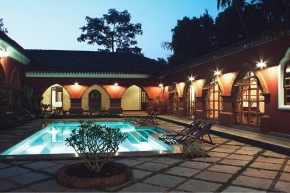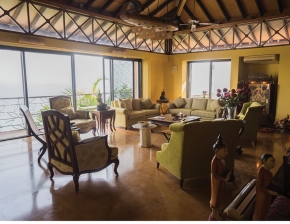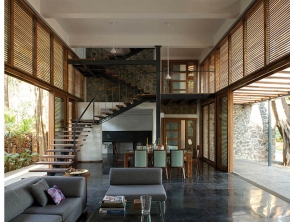Latest
- Procter & Gamble India to produce and donate 1.5 million face masks and hand sanitizers
- VFS Global launches portal for Vietnam eVisa
- Bike rental aggregator Lemiride launched in Goa
- Manipal Hospitals Goa launches super speciality clinic in Margao
- Bhate wins Business Diva crown for agrowaste work
- CMM Arena announces Gudi Padwa offers
- Avi’s Opticians: one-stop shop for all your eyewear needs
- Gera Developments shines at Realty+Conclave awards
- CM inspects Sada garbage treatment plant
- CM welcomed onboard Angriya cruise
Seven statesmen
By Patricia J Pereira-Sethi on June 08, 2017
Former Newsweek United Nations bureau chief Patricia pereira Sethi looks back at the 7 most interesting world leaders she interviewed during her career
My promotion from assistant editor to the United Nations bureau chief of Newsweek magazine in New York opened the conduit to several one-on-one conversations with presidents and prime ministers, as well as important cabinet ministers, who attended the annual General Assembly sessions every September.
If a head of state was unable to be present, I would request his stand-in, usually the foreign minister, for a meeting with his leader. I also arranged gatherings with visiting dignitaries at the Top of the Week dining room on the 42nd floor of the Newsweek building at 50th Street and Madison Avenue.
It was an exquisitely designed and furnished space, executed by the famous architect I M Pei. Scores of leaders came to breakfast, lunch or tea with magazine owner Katharine Graham, and a few senior editors; I reviewed all the menus planned by our in-house French chef, so that no gaffes could occur. (Before I joined the magazine, someone had committed the unpardonable offence of serving alcohol and ham to a Middle Eastern leader, and meat to a vegetarian!)
The number of exclusive interviews in my repertoire totalled more than 45 heads of state during my career, a record number for any journalist. Newsweek indicated its appreciation by saturating the local and foreign media with a two full-page colour spread advertisement centred around my work. It detailed my scoops, then praised my dedication to excellence, concluding with the words: “When you have a reporter who won’t take ‘no’ for an answer, people start saying ‘yes’ to your magazine.” The ad made my elderly parents proud and happy – and that was enough for me!
Sheikh Mujibur Rahman
President, Bangladesh
My first interview with a head of state was with Bangladesh’s Sheikh Mujibur Rahman, or Bangabandhu (Father of the Nation) as he was fondly referred to. I was understandably nervous: it signalled my first foray into the Major League.
He had just been swept into power with the help of Indira Gandhi and he demonstrated a great fondness and warmth towards India and all things Indian. He said so loudly and clearly. Any trepidation I experienced faded away almost immediately: he made me feel very comfortable at his suite in the Plaza hotel, across the street from the United Nations.
He never balked at any of my questions, including a rather tough one in which I asked him to react to Henry Kissinger’s snide remark about the newly-constituted nation being “an international basket case.” Sheikh Mujib replied with characteristic dignity and grace: “One must remember that Bangladesh is not an empty basket. Our nation has much to offer the outside world.” And he went on to tick off a list of items: jute, tea, gas and coal, as well as liberty and democracy.
When he and his family were slaughtered in cold blood by a military cabal which ravaged the fledgling democracy, I was extremely disturbed. Why do good and decent men have to die so cruelly,
I wondered?
Fidel Castro
President, Cuba
Fidel Castro had refused to talk to the press for more than five years when I made a concerted and bold thrust for an exclusive conversation. Realising how tough it would be to obtain this interview, I moved like a player on a chessboard, slowly but surely, working out a methodical win-win strategy.
First I corralled the Cuban ambassador to the United Nations, then the Cuban emissary in Washington. Next I blitzed the vice president and the foreign minister who had arrived in New York to attend the General Assembly session. I asked other Latin ambassadors and leaders for help, especially those who were close to Cuba at the time.
I staked my claim yet again when I caught up with Fidel’s sister-in-law Vilma Espin, the wife of his brother Raul, who was attending a Women’s Forum at the UN. I told her that she should convince her brother-in-law to grant an interview to a woman who was born in the developing world. These relentless and persuasive attempts, lasting several months, finally secured a Cuban visa for me to cover the 25th anniversary of the Revolution.
No meeting with the president was guaranteed at the time. After I arrived in Havana, I continued pitching again for an exclusive, along with scores of other reporters who were there as well. As luck would have it, the day before the commemorative event, I received a call “to stand by and be ready to move” at 10pm that night.
Newsweek’s photographer and I arrived at the Palace of the Revolution where Fidel has his office: you could cut the tension with a knife. After passing through various military checkpoints, we entered the president’s chamber. Fidel stood in his army fatigues and military boots at the door, towering above me at 6’2”.
He was extremely serious and formal throughout the three-hour session: he answered all questions without flinching or missing a beat – even some very tough ones about the Cuban collapse before US forces which had invaded the Caribbean island of Grenada.
But after the interview concluded, he dropped his official demeanour and proclaimed aloud to the aides present: “At long last I have fulfilled your wishes, I have granted an interview to La India (he always called me La India even though I worked for an American news organisation). I have completed my duty.”
When I looked quizzical, he explained further. “Do you know how much pressure you have placed on me during these past several months? Everywhere I went, someone or the other was pleading with me to give you an interview. My vice president requested it, my foreign minister made a solid pitch on your behalf, the embassies recommended a meeting and a zillion others have prodded me into granting you an interview. I repeatedly rejected all these overtures: No interview, no interview, I said. But when I went home and my sister-in-law told me ‘You must talk to La India’, I acknowledged defeat. La India had finally invaded my private turf, my personal space. Imagine, she had not merely tailed and shadowed all my advisers and aides, she had assaulted my privacy. What could I do? I threw up my hands and surrendered. I capitulated to La India.” To peals of laughter all round. The following evening he delivered a two-hour speech in Santiago de Cuba to a massive crowd. And the morning after, he picked me up in his jeep from my hotel (to the consternation of all the other journalists there!) to take a guided tour of the eastern part of his nation along with Nobel laureate Gabriel García Márquez.
At one halt, he seasoned and sautéed some fish he had caught (he loved to fish and cook for fun and relaxation), then drove us up to his retreat in the hills for lunch where a complete lamb was spinning on a spit. (Someone had informed him that I don’t eat pork, which is the top Cuban delicacy, in deference to the movie “Babe” which had stirred my emotional chords and clamped down on my culinary tastes).
Later that evening after the sun had set, we flew back to Havana on the presidential plane. I have hundreds
of similar anecdotes with hours and hours of taped conversations with him. He was a master story-teller:
an iconic, charismatic and scintillating personality!
Indira Gandhi
Prime minister, India
Indira Gandhi treated me with great cordiality from the first moment we met. I guess it was because we were both women, Indian women. Besides, I believe she took pride in the fact that I was the first Indian to be appointed to an important position by a major American news organisation (as her press secretary explained to me).
Whereas most journalists have reported that she was stuffy, pompous, cold and indifferent, I did not find that to be the case at all. I did three exclusive interviews with her when she was prime minister and finally worked on her obituary, steeling my sentiments as I did so.
I distinctly recall one September afternoon when she was at the United Nations to address the General Assembly: I was sitting in the delegate’s lounge sipping on a cappuccino, exhausted after a morning of running from one press conference to another.
Suddenly I felt a hand on my shoulder. When I looked up, it was Indiraji smiling down at me. She asked what I was drinking and then went on to advise me not to drink too much coffee. It gives you a momentary lift and that’s all, she remarked. Try some tulsi tea instead. I promptly asked her for the secret to her immense energy and good health, and she detailed her daily routine for me. Frugal meals at fixed times, bananas for snacks, yoga and meditation, and no vices at all.
She then continued to talk to me on a very personal level about her relationship with her daughters-in-law and her late husband. There were no holds barred here. Natwar Singh, who was standing by her side listening in, later commented that I should feel extremely privileged to have been drawn into her private moments, because she rarely opened up in this manner with anyone, least of all with a journalist.
Zulfikar Ali Bhutto
Prime minister, Pakistan
After my first interview with Indira Gandhi, my editors packed me off to Pakistan to interview prime minister Zulfikar Ali Bhutto. I walked across the Wagah border from Amritsar where a US embassy car was waiting to drive me to Lahore. (Yet another example of how the magazine fretted and worried about its correspondents. They were afraid about me walking into “a lion’s den” given my Indian passport and took great precautions to make sure that I was safe).
From Lahore I flew to Rawalpindi, but not before the American consul who accompanied me to the airport pointed out that the jeep following closely behind contained members of the Pakistani security agency. They were reporting on all my movements – for even though I represented a US magazine during the interview, I was an Indian after all. Bhutto’s desk was a harsh muddle of phones and speakers and audio equipment. I felt like I was in a radio station. He appeared cold and portentous, a sharp contrast to Indira Gandhi’s warmth and grace, and her uncluttered and organised desk.
But after the interview was completed, he loosened up somewhat. He asked me about my background and the origins of my last name, Sethi. I told him that my Hindu husband’s family came from Hazara and had to flee to India during the Partition.
I was promptly sent off to Hazara in a Mercedes, a 90-minute ride, to touch base with the region they had originated from. It was an idyllic place, full of fruit orchards, undulating hills, tall trees and lush foliage.
Since I had also mentioned that my husband was a connoisseur of Urdu poetry and ghazals, Faiz Ahmed Faiz, the great Urdu poet, suddenly appeared at the Rawalpindi Gymkhana to greet me and give me an autographed copy of his works for my husband.
After the interview was over and done with, the hospitality of my host was most compelling. The Pakistanis are specialists in public relations!
General Augusto Pinochet
President, Chile
General Augusto Pinochet, strongman of Chile, was not an easy person to interview. He disliked the press because he felt they had treated him unfairly. Besides, he possessed an autocratic military mind and a tough, hard-hitting attitude towards most. I flew down to Santiago as soon as the Chilean mission to the UN handed me a visa for the exclusive.
I walked into the presidential study at La Moneda palace early one March morning after being greeted by a score of military personnel en route. The general welcomed me with a flourish bordering on gallantry: he extended his hand, then bowed low in traditional Spanish greeting and complimented me on my sari.
He had shed his military uniform for a dark blue suit, blue shirt with red tie, white socks and black shoes. I couldn’t imagine that this personality, who had been dubbed “the butcher of Chile” and who had ordered thousands of his opposition gunned down in cold blood or tossed alive from hovering helicopters into the mid-ocean, was now sitting here looking like a dear sweet grandfather.
The entire scene was out of another era: the traditional furniture, the quaint formality of the greeting, the archaic gold telephone in a velvet box at his elbow, and the old-world responses to questions dealing with issues of the 20th century.
Fifteen minutes into the interview, when I started stoking the subject of human rights abuses in his nation, he stopped abruptly. He glanced at his gold wristwatch and informed me that the conversation had concluded: he had an important meeting scheduled with the junta.
I was horrified: the discussion was only just beginning. I protested that I had not taken a 13-hour plane ride for a 15-minute encounter. If he could not speak to me at this time, I told him I would sit right there in his office and wait until his conference with the generals was concluded and we could resume again.
My protest worked. He relented awkwardly when he realised I did not plan to budge. He informed his aides that he was not to be disturbed for another hour: the interview lasted 90 minutes. It made headlines worldwide, with his words splashed all over: “I am a messenger of God. I have God on my side as I lead the battle for Christianity and Spiritualism against the Devil of Marxism and Materialism.” He truly believed he was God’s knight in shining armour!
Pham Van Dong
Prime minister, Vietnam
The Vietnamese mission called up one afternoon to tell me to head to Bangkok to pick up my visa for Vietnam. Since I always had a packed bag ready to roll at a moment’s notice, I left shortly thereafter on a United Airlines flight to Thailand via Seattle. I was the only one in first class and spent most of the journey chatting with the stewardesses. The crew was wonderful, a far cry from the reports we read today of passengers being dragged and bumped off United flights.
Since the visa issue had still not been sorted out when I arrived in Bangkok, I enjoyed five wonderful days in Thailand playing tourist. I then flew to Hanoi, an exquisitely planned city full of French-style colonial buildings and striking foliage all around. Everyone appeared to be riding bicycles. Hardly a car was to be seen on the road.
My interview with prime minister Pham Van Dong coincided with the 30th anniversary of the victory of the Battle of Dien Bien Phu which marked the end of French colonialism in Indochina. It was easy and relaxed. As Ho Chi Minh’s right-hand man, Pham had helped spearhead the guerrilla war against American might until Saigon fell and his country was free again.
Pham was a hardened dyed-in-the-wool Communist, but the gentility and elasticity he displayed during our meeting belied his hard-line doctrinal tendencies. His reason for granting the interview was to extend an olive branch to the US government about the urgent need to restore full diplomatic relations and to resolve important pending issues, which included the return of US war dead and the repatriation of Amerasian children (the countless offspring of American soldiers and Vietnamese women).
The conversation took place in a beautiful and lush garden, in the shadow of the yellow painted Presidential Palace. A rosewood table holding flowers, tea and biscuits was placed between two easy chairs. Only a translator was present. No aides, no fuss, no pomp, no show, no bodyguards. Simplicity, parsimony
and elegance marked every aspect of the man.
After the discussion, he took me by the hand to a pond filled with lily pads and lotuses at the edge of the garden. There he called out to the fish swimming there by their names and as each one popped its head up, he
hand-fed it a bread crumb. He gave me some crumbs to drop in as well.
“This was Uncle Ho’s favourite spot,” he explained. “This is where he relaxed with his fish: he christened each of them and knew them all by name. They would all come to him when he called them. We have preserved and maintained this legacy,” Pham concluded.
Later that night I was invited to join several ministers for a banquet at the palace. I sat next to foreign minister Ngyuen Co Thach, who had earlier served as the Vietnamese ambassador in New Delhi and whose son had studied in India. He was fluent in English and helped mould the conversation.
I recall tucking with gusto into the delicious nem ran rice paper rolls (similar to Chinese spring rolls, only crunchier, thinner and longer) that launched the first course. I had not eaten anything all day, having refused the breakfast porridge at the hotel because I found a small cockroach in it.
Thach gently suggested that I stop tasting any more rolls since the feast comprised seven courses and he wanted me to experience every single aspect of authentic Vietnamese cuisine!
Babrak Karmal
President, Afghanistan
From Vietnam I flew to India to visit with my parents in Mumbai when the office informed me that my Afghan visa was waiting for me in New Delhi. I was off to Kabul via Aeroflot. Initially the Russian crew would not let me alight in Kabul and the tarmac, which was controlled by Soviet troops, became the scene of a major diplomatic altercation.
Finally, a representative from the Afghan foreign ministry convinced them that I was there for a purpose, but only after the plane was delayed for an extremely long time, to the irritation of all the other passengers.
President Babrak Karmal was a striking Afghan, Pathan style (some say he was a Tajik, others a Pashtun, still others a Kashmiri), with the elegance and stylish good looks of a Bollywood movie star. With his country overrun by nearly 110,000 Russian troops as he battled mujahedin guerrilla forces covertly armed by the Americans at the time, he was literally living under the gun.
However his demeanour belied that. He was friendly and expansive, and had winning ways. He insisted he was not the puppet of the Soviet Union. He claimed he was a revolutionary in the service of his people.
We discussed the problem of the Panjshir valley which had been the scene of violent battles only recently. When Karmal insisted that it had been cleaned out of all guerrilla forces and was under his complete control, I took the bait. I asked him if he would permit me to see for myself. He was shocked momentarily, then replied, how can I expose a young lady to any danger? That offered me yet another gambit. I responded that if the valley posed a threat to me, then it was not as peaceful and controlled as he was making it out to be. Let’s see what I can do, were his parting words at the conclusion of the interview.
Early the following morning I was aboard a Soviet-made helicopter gunship heading for the valley. The copter banked sharply to the left of Kabul and flew right through a mountain pass into the Panjshir valley. Across the mountain tops and ridges I saw clear evidence of carpet bombing, row after row of bomb craters. Ridges, slopes and smaller valleys off to the side, the place where guerrillas presumably had their hideouts, were pockmarked with holes or buried under avalanches.
Most of the valley floor was still luxurious and green, but there appeared to be no activity that was not military. Army positions large and small spread out across the expanse of the countryside.
We landed at the town of Barak, the site of a major military command centre. I was met by General Mohammad Jamal of the Afghan army and several other commanders who assured me constantly that they were in complete control of the region.
Their Soviet allies were nowhere in sight except for the occasional blonde Russian head which would mistakenly pop out off a tank-top. On seeing me, however, he would drop right back in. I ate lunch – lamb and naan – with the generals in the valley and we talked for an hour about various military strategies to handle guerrilla movements before I returned to Kabul.
My sortie into the Panjshir was viewed to be a major coup in journalism because it was the first time an outsider was allowed into an Afghan battle zone. My editors were delighted. And American supporters of the mujahedin now had first-hand proof that the US government needed to allocate highly advanced military weapons and much more money to the guerrillas to help them fight the Russians. Thus the Taliban was born!


